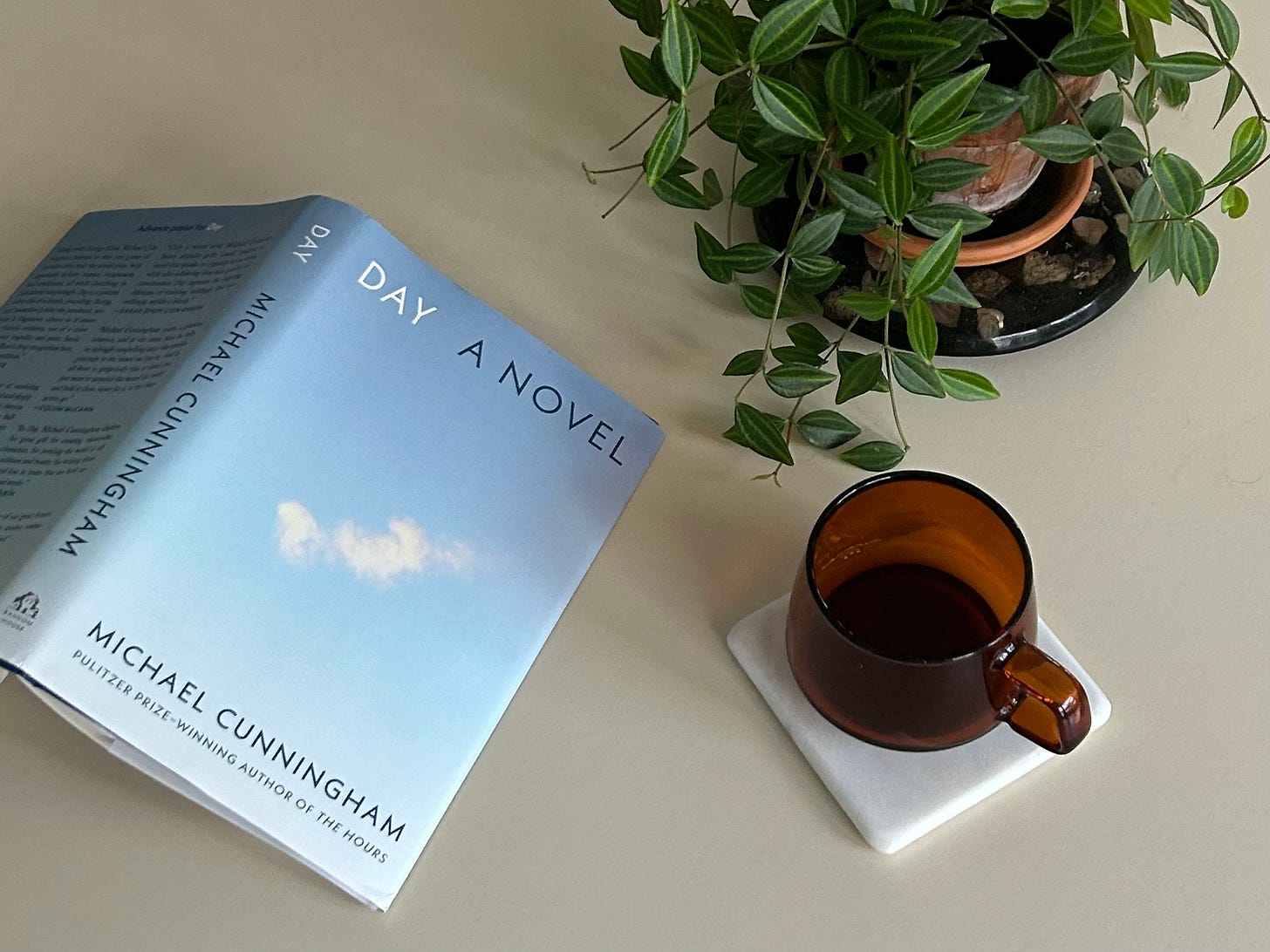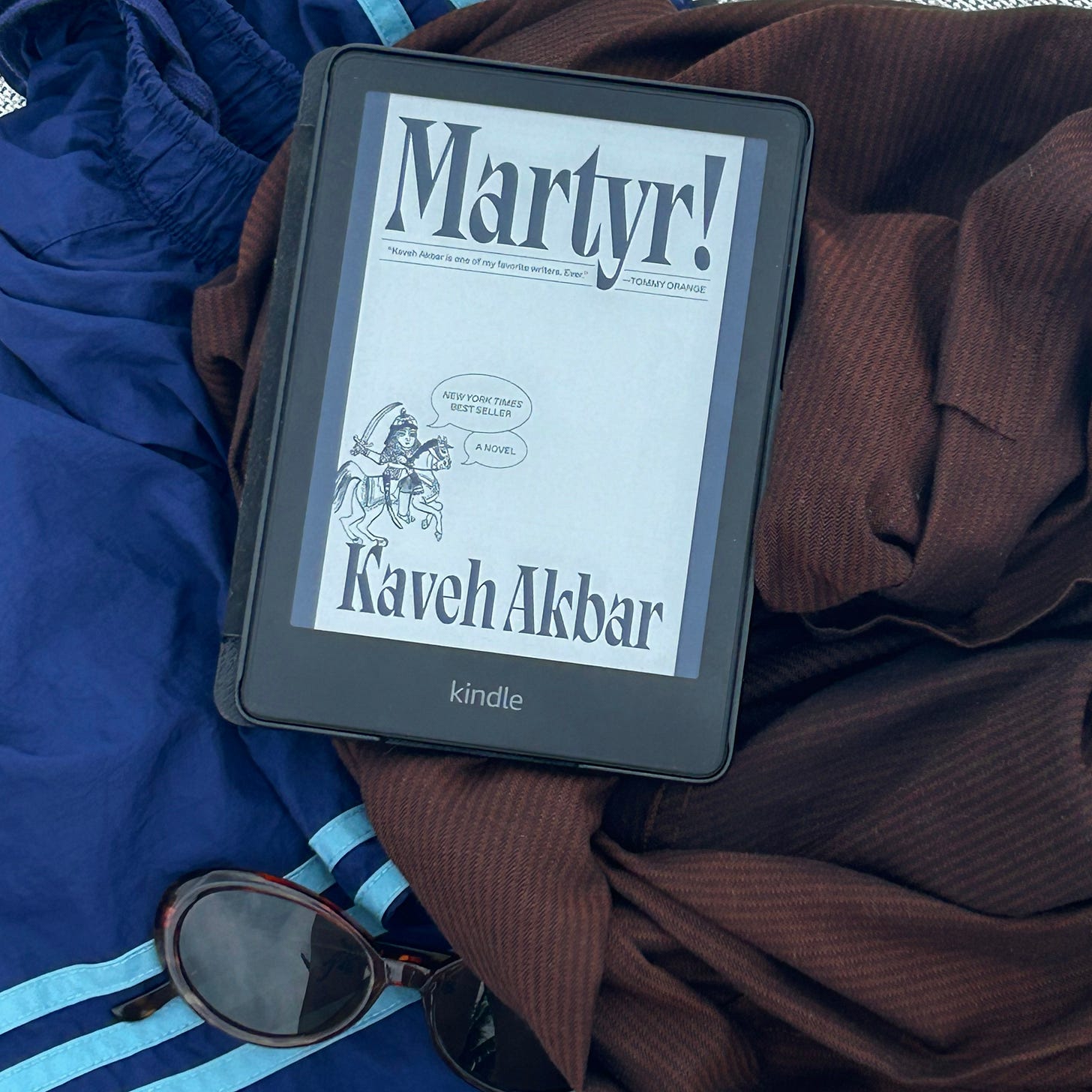It is a daunting task to generate a reading round-up, especially after leaving this space a bit dormant for nearly two months. This is a long one!
I read 122 books in 2024, which is more than I’ve ever consumed in a single year. I don’t like the word “consumed” paired with reading—it cheapens the act of spending hours with someone else’s carefully selected words. I was talking to my husband about how a few people have asked how I read so much, and I don’t know how to answer that because I don’t think it’s as fruitful for the spirit (or my spirit, at least) to finish a lot of books in a short period of time. He (a runner in marathon training) said that would be like telling a runner who has never done a marathon to just…go run 30 miles—they would do it, but they’d end up injured.
I don’t like that I read that much, and I don’t mean that as a humblebrag. When I wasn’t sitting down with a book in hand (or on screen), I was doing other tasks (driving, knitting, cleaning…always cleaning) and listening to audiobooks (with Libby, NOT with Audible…I will help you get access to Libby if you don’t have it already). I was forcing out my internal voice in favor of a narrator, and I was seeking a story fabricated instead of participating fully in my own lived story. This was my injury (if we’re keeping with the running analogy)—I walked away having intellectualized my emotions and only remembering loose plots in many of the stories rather than synthesizing their lessons and my emotions towards them.
It’s not all bad. I read a lot of poetry. I haven’t read this much poetry since I was writing my thesis in undergrad. Reading a lot of poetry felt like being recalibrated. I found so much good poetry this year, and it made me write more than I have in a decade.
I’ve set a reading goal of 52 books per year for the last couple of years, but I don’t pay much attention to it anymore. I log my books in StoryGraph and Goodreads and don’t really watch the number tick up. Personally, reading goals were helpful when I first got back into reading in 2019. A number was a way to hold myself accountable and to form a habit. Now, the habit has not only formed, but it has evolved into a compulsion. I have to read. I have to read to understand other people and myself, and I have to read in order to write.
In 2025, I want to be more conscious about how I read. I want to take time with stories. I want to remember what I loved about each book so I don’t have to do this newsletter next year (lol). I didn’t set a reading goal for this year, and that may change, but I don’t think I need to. Reading is a part of my daily routine, and I don’t feel having a number serves my reading and writing practice anymore.
Here are my favorite books from each month. Skip to the end if you just want my top 3ish books in different categories.
˙༄.°˙༄.°˙༄.°˙༄.°˙༄.°˙༄.°˙༄.°˙༄.°˙༄.°˙༄.°˙༄.°˙༄.°˙༄.°˙༄.°˙༄.°˙༄.°˙༄.°˙༄.°˙༄.°˙
January
Day by Michael Cunningham—this was my first book of 2024, and I loved it. I appreciate stories that skip ahead in years using a specific date as a fulcrum upon which the plot can rest so the characters can develop.
February
True Biz by Sara Nović—This is a great book if you’re in a slump. It educates on a topic we all need to understand better (unless we are in or approximate to the HOH/deaf community), it has the intrigue of a campus novel, and it has the heart that could pull in any reader.
I both read and listened to this, and I appreciated that you could hear the narrator sign as they read the text.
March
Concentrate by Courtney Faye Taylor—I found this while browsing the ebooks on my library’s catalog, and it packs a punch. Taylor’s poems paint the story of Latasha Harlins, the injustice of her murder, and the community’s response to the tragedy of her death. It is a multimedia mosaic of Latasha’s life that implores the reader to move beyond the book and to see her everywhere.
April
Martyr! by Kaveh Akbar—I’m sure you’ve seen this on many lists at this point, and there’s a reason. It’s honest, it has a twist, and it’s poetic. Poets write the best novels.
“It seems very American to expect grief to change something. Like a token you cash in. A formula. Grieve x amount, receive y amount of comfort. Work a day in the grief mines and get paid in tickets to the company store.”
“Love was a room that appeared when you stepped into it.”
Woman, Eating by Claire Kohda—This has been considered “horror” by StoryGraph, and that is not a genre I ever venture into. However, I did devour this in a couple of days. It is a vampire novel, which is not my thing, but Lydia is a normal girl who happens to drink blood to exist. All of her efforts, struggles, daily grievances, and basic needs felt so human that I almost forgot it was a vampire novel.
Ponyboy by Eliot Duncan—I wrote a review of this on Goodreads, but this novel surprised me. I received this as book PR, so I went in with no expectations. I hated the first half of it, the language pissed me off, it felt like an MFA novel, etc. I fell for the unreliable narrator bit. It got me! The second half was so good.
May
Brute by Emily Skaja—This was another collection of poems I found while browsing ebooks on the library’s website. I think the best way to promote a book of poems is to share part of one:
“It's easy to be angry
about how much hope there is
in reaching
The whole house gone
& so many little monuments
to the wrong thing”
I Do Everything I’m Told by Megan Fernandes—I also encountered this through the library, but I immediately bought a copy and recommended it to many of my friends.
“Optimism plus
despair is the soup of our time.
No hope here. No sea. Some
degraded trees and always
a map that wants to become
something else. I wouldn’t know
a border unless I hit an ocean.”
June
Good Grief, the Ground by Margaret Ray—This is another one I purchased before finishing because I knew I would want to dog-ear it.
“I want to pour
my life into a different container,
but it’s still river water.”
Worry by Alexandra Tanner—this reminded me of my relationship with my older sister. It’s a good audiobook.
Grief is for People by Sloane Crosley—I read this at the exact right time, which was weeks after my aunt’s death. Crosley is a beautiful writer, and this doesn’t have religious undertones the way many books/memoirs on grief tend.
Goldenrod: Poems by Maggie Smith—I had never encountered Maggie Smith’s poetry somehow, even though I lived probably five miles from her for three years of my life. This is a good place to start if you’re curious about poetry. Her work is super approachable.
July
The Coast Road by Alan Murrin—I have a strange relationship with this one as I read this, fevered with COVID, in two days, which means it must have been quite enjoyable. It takes place in Ireland before divorce was legal in the ‘90s. It has a good plot and vivid characters.
August
Deaf Republic by Ilya Kaminsky—Dear Ilya Kaminsky, I wish I could rummage through your brain for a week and take a few souvenirs. I got to meet him when I was an intern at the Wick Poetry Center, and he is a gentle, humble, brilliant poet. Read anything by him, please.
Tomorrow, and Tomorrow, and Tomorrow by Gabrielle Zevin—I’d seen this everywhere since it came out and decided to finally give it a whirl. Don’t let the topic of video games scare you. I loved it for the character development, especially since the story takes place over many years. The evolution of video games ends up being a beautiful lens for this story.
September
All Fours by Miranda July—I’m a longtime fan of Miranda July. I love that she will write without care for socially acceptable behaviors. My favorite is still her collection of short stories.
Housemates by Emma Copley Eisenberg—I loved this for its perspective, for its queerness, for its plot.
The Crying Book by Heather Christle—This was recommended by my friend Sonia, and I loved every morsel of it.
“But it is dangerous to lay a map of one’s life over another’s, to make it a trap.”
October
Heaven by Mieko Kawakami—I randomly saw this on a shelf at work, read the first page, and checked it out. This is a heartbreaking read if you’re deeply affected by bullying (i.e. if you’re like me and tear up/leave the room when they’re mean to Gary/Jerry on Parks & Rec). The prose is simple and stunning, and it’s a quick little read.
Space Struck by Paige Lewis—I think I loved every page of this collection.
“A miracle is anything that God forgot
to forbid.”
November
There’s Always This Year by Hanif Abdurraqib—You don’t have to love (or even like) basketball to love this book. His writing is divinely poetic, especially when recounting his life through the lens of basketball. I am constantly in awe of his ability to write passionately without a saccharine quality.
The Hearing Test by Eliza Barry Callahan—I found this simply walking through the fiction stacks of my local library (not the one where I work). I was drawn in by the bright orange on its spine. This is a great little read if you are interested in no plot, just vibes. A young woman gradually loses her hearing, the writing is really good, etc.
December
Truth & Beauty by Ann Patchett—I listened to this in its entirety on December 31 while I was deep into knitting a sweater all day. This was my first time with Patchett’s work. It’s about her friendship with poet/author Lucy Grealy, and there are few relationships more beautiful than those between female writers, imo.
˙༄.°˙༄.°˙༄.°˙༄.°˙༄.°˙༄.°˙༄.°˙༄.°˙༄.°˙༄.°˙༄.°˙༄.°˙༄.°˙༄.°˙༄.°˙༄.°˙༄.°˙༄.°˙༄.°˙
Top Fiction:
Martyr! by Kaveh Akbar
The Hearing Test by Eliza Barry Callahan
Tomorrow, and Tomorrow, and Tomorrow by Gabrielle Zevin
Top Nonfiction:
There’s Always This Year by Hanif Abdurraqib
Truth & Beauty by Ann Patchett
Grief is for People by Sloane Crosley
Top Poetry:
Good Grief, The Ground by Margaret Ray
Brute by Emily Skaja
Space Struck by Paige Lewis
˙༄.°˙༄.°˙༄.°˙༄.°˙༄.°˙༄.°˙༄.°˙༄.°˙༄.°˙༄.°˙༄.°˙༄.°˙༄.°˙༄.°˙༄.°˙༄.°˙༄.°˙༄.°˙༄.°˙
Phew, thanks for reading, if you made it down here! xo













Such a good round up! I am thinking about following your lead on reading more poetry this year. Love the recs!
Love this! Such a great roundup! And as a librarian, I, too LOVE Libby!